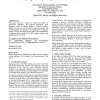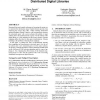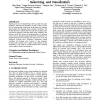130
click to vote
JCDL
2005
ACM
15 years 8 months ago
2005
ACM
Most digital libraries (DLs) necessarily focus on the complex issues that arise when library collections are freed from their physical anchors in buildings and on paper. Typical i...
132
click to vote
JCDL
2005
ACM
15 years 8 months ago
2005
ACM
The distributed, project-oriented nature of digital libraries (DLs) has made them difficult to evaluate in aggregate. By modifying the methods and tools used to evaluate tradition...
JCDL
2005
ACM
15 years 8 months ago
2005
ACM
In this article we present an evaluation of text clustering and classification methods for creating digital library browse interfaces, focusing on the particular case of collecti...
129
click to vote
JCDL
2005
ACM
15 years 8 months ago
2005
ACM
The Digital Anthropology Resources for Teaching (DART) project integrates the content acquisition and cataloging initiatives of a federated digital repository with the development...
124
click to vote
JCDL
2005
ACM
15 years 8 months ago
2005
ACM
Users of modern digital libraries (DLs) can keep themselves up-to-date by searching and browsing their favorite collections, or more conveniently by resorting to an alerting servi...
104
Voted
IQIS
2005
ACM
15 years 8 months ago
2005
ACM
In this paper, we consider two important problems that commonly occur in bibliographic digital libraries, which seriously degrade their data qualities: Mixed Citation (MC) problem...
181
click to vote
HT
2005
ACM
15 years 8 months ago
2005
ACM
This paper describes a method to analyze the history of hypermedia collections. We gathered information about documents using the Internet Archive’s Wayback Machine. Analysis fo...
122
Voted
ICDCSW
2005
IEEE
15 years 8 months ago
2005
IEEE
Alerting for Digital Libraries (DL) is an important and useful feature for the library users. To date, two independent services and a few publisher-hosted proprietary services hav...
122
click to vote
SAC
2006
ACM
15 years 8 months ago
2006
ACM
Structured data and complex schemas are becoming the main way to represent the information many Digital Libraries provide, thus impacting the services they offer. When searching i...
111
click to vote
JCDL
2006
ACM
15 years 8 months ago
2006
ACM
Exploring services for digital libraries (DLs) include two major paradigms, browsing and searching, as well as other services such as clustering and visualization. In this paper, ...



